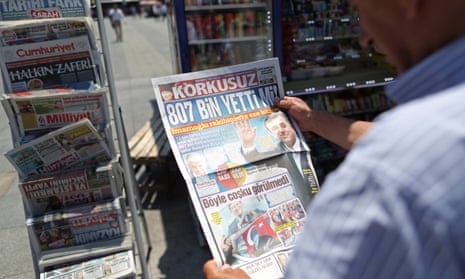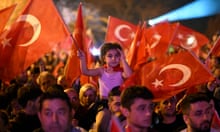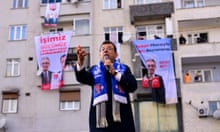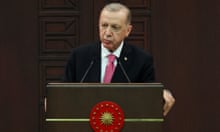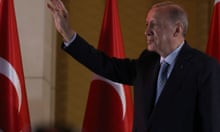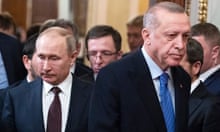The last partygoers went home as the sun came up. Across Istanbul on Sunday night, hundreds of thousands of opposition supporters danced in the streets waving Turkish flags and brandishing glasses of beer and raki after their candidate for mayor delivered the most serious blow to the president, Recep Tayyip Erdoğan, in his political career.
As municipal workers cleaned up on Monday morning, however, the front pages of Turkey’s pro-government newspapers downplayed the unprecedented success of the Republican People’s party (CHP) mayor-elect, Ekrem İmamoğlu.
“Istanbul has voted,” read the subdued headline of the usually rabidly pro-Erdoğan tabloid Yeni Şafak. There were no pictures of the fireworks and scenes of jubilation hours before.
While the opposition nurses a collective hangover, attention is turning to what the president’s next move will be. İmamoğlu ended 25 years of Islamist party dominance in the rerun for control of Turkey’s biggest city and economic centre, which accounted for 31% of GDP in 2017.
The result has serious financial implications for the ruling Justice and Development party (AKP) and its patronage networks, and will amplify the sense among the opposition and within Erdoğan’s party that the president’s power is starting to wane.
The loss of Istanbul also has repercussions for policymaking in Ankara. The second defeat has ossified divisions within the president’s party and has led to a collapse in public support for his coalition partner, the rightwing Nationalist Movement party (MHP). Erdoğan needs the MHP to command a majority in parliament. A cabinet reshuffle is likely.
The former president Abdullah Gül and the former prime minister Ahmet Davutoğlu both openly criticised the AKP for seeking a rerun, fuelling rumours in Turkish media that the senior politicians were preparing to form breakaway parties.
There is also speculation that Erdoğan may call a snap election to rid his government of fractious elements as he grapples with issues such as Turkey’s struggling economy, Ankara’s next steps in Syria’s war and the prospect of US sanctions over the planned purchase of a Russian S-400 missile system.
Nicholas Danforth, a senior visiting fellow at the Washington-based German Marshall Fund thinktank, said: “Erdoğan is adept at being conciliatory when necessary and cracking down on dissent when necessary.
“To date, he has maintained power by using both of those methods effectively. Last night’s result is something new, making it hard to tell what the president will do next to reverse the momentum that is building against him.”
Many İmamoğlu supporters were anxious in the hours between voting closing and the first results on Sunday night that the government was planning to challenge what polls showed was likely to be a decisive second victory. His narrow win in March was annulled by Turkey’s election board after it upheld one of dozens of AKP procedural complaints.
However, the AKP candidate, Binali Yıldırım, avoided the embarrassment of watching a slow-motion defeat by conceding minutes after the initial results began trickling through, striking a conciliatory tone as he wished İmamoğlu luck. The president issued his congratulations to İmamoğlu on Twitter shortly afterwards and Turkey’s electoral board ratified the victory by a staggering margin of more than 800,000 ballots – 54% of the vote – on Monday.

Turkey’s borrowing rates eased and the lira rallied to 5.717 against the US dollar, up nearly 2%, as the repeat election ended months of political uncertainty.
The decision to rerun the contest, defying the will of voters who had chosen to punish the government for its mishandling of the economic crisis, was an unusual strategic error by the AKP. The mistake was compounded by an erratic and sloppy second campaign in which Yıldırım was forced to play catch up to İmamoğlu. The opposition candidate, already popular for his inclusive and anti-populist stance, was able to canvass on a new platform of saving Turkish democracy.
As polls in the lead-up to the repeat election showed İmamoğlu pulling ahead by 9%, the government resorted to desperate tactics. Erdoğan insinuated the opposition candidate was working with the outlawed Kurdistan Workers’ party (PKK) and a bizarre statement carried on the official government news agency from the jailed PKK leader Abdullah Öcalan called on Istanbul’s approximately 4 million Kurdish voters not to support the secular CHP’s İmamoğlu. The measures backfired after Kurdish political parties reiterated their unofficial coalition support for İmamoğlu.
On Sunday night, the swift and gracious acknowledgement of defeat from the AKP struck yet another tone.
Lisel Hintz, a professor at Johns Hopkins University’s European and Eurasian studies department, said: “We still need to see how Erdoğan reacts to İmamoğlu’s victory. Istanbul serves not only as a symbol of where he launched his political career, but also as a massive source of rents that can be used to garner electoral support.
“We’ve seen already through the rerun that he was not willing to let it go easily. We now have to wait and see whether İmamoğlu’s tenure as mayor will be interfered with in any way, whether by cutting off funding and hampering his office’s ability to provide services or by removing him under some legal pretext.”
Also on Monday, the trial began of 16 prominent figures from the 2013 Gezi Park protests in Istanbul that challenged Erdoğan’s authority – a reminder that while Istanbul has signalled its overwhelming appetite for change, the president has over the years consolidated his grip on Turkey’s democratic institutions, and remains very much in control.
For many, memories of the 2015 general election which ended the AKP’s majority in parliament – but was reheld in October that year, yielding a more favourable result for the ruling party – are still fresh.
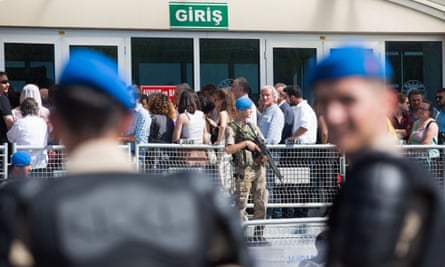
The overarching mood on the city’s İstiklal Avenue and in liberal neighbourhoods was still upbeat, however, as the opposition relished its rare victory.
“I want İmamoğlu to follow through on the promises he made to the city,” said Aysun Oktay, 18. “I want more sports facilities and opportunities for young people.”
“Her şey çok güzel olacak [everything’s going to be alright],” she said, echoing the slogan of İmamoğlu’s second campaign. “He has shown us we can trust him.”
Additional reporting by Gökçe Saraçoğlu
